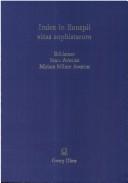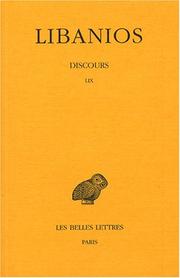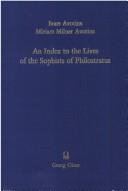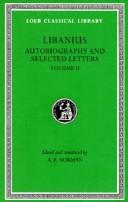| Listing 1 - 9 of 9 |
Sort by
|
Book
ISBN: 9788845291913 884529191X Year: 2014 Publisher: Milano Bompiani
Abstract | Keywords | Export | Availability | Bookmark
 Loading...
Loading...Choose an application
- Reference Manager
- EndNote
- RefWorks (Direct export to RefWorks)
Book
ISBN: 9780197571231 9780190618858 0190618868 0197571247 019061885X 0197571239 0197571255 Year: 2021 Publisher: Oxford Oxford University Press
Abstract | Keywords | Export | Availability | Bookmark
 Loading...
Loading...Choose an application
- Reference Manager
- EndNote
- RefWorks (Direct export to RefWorks)
"The story of Sosipatra of Pergamon (4th century C.E.) as told by her biographer, Eunapius of Sardis in his Lives of the Philosophers and Sophists, is a remarkable tale. It is the story of an elite young girl from the area of Ephesus, who was educated by traveling spirits (daemons), and who grew up to lead her own philosophy school on the west coast of ancient Asia Minor. She was also a prophet of sorts, channeling divine messages to her students, family, and friends, capable of mentally viewing events that were happening in other locations, and foretelling the future. This volume is the first sustained, book length, attempt to tell the story of this mysterious woman. It presents a rich contextualization of the brief, sketchy, and highly fictionalized portrait provided by Eunapius"--
Book
ISBN: 9780198713401 0198713401 Year: 2015 Publisher: New York, NY : Oxford University Press,
Abstract | Keywords | Export | Availability | Bookmark
 Loading...
Loading...Choose an application
- Reference Manager
- EndNote
- RefWorks (Direct export to RefWorks)
This volume - the first project of its kind in the field - collates c. 1200 biographical entries on Greek sophists and rhetors who flourished in the Roman Empire from the first to the seventh century AD. Ancient Greek sophists, the masters of speech and teachers of rhetoric, constituted one of the most important and interesting intellectual circles of the ancient world. The prosopography provides comprehensive information on sophists and their activities, using abundant and varied source material such as literary texts (including those of the rhetors themselves) and papyrological, epigraphic, and numismatic evidence. Each entry provides data (where available) on sources in which the person is attested, biographical details, career, and rhetorical activity. This book constitutes a basis and a tool for subsequent in-depth studies on the Greek Sophistic movement, as well as a useful reference book for students and all those interested in the culture of the ancient world.
Sophists (Greek philosophy) --- Rhetoric, Ancient. --- Prosopography --- Orators --- Sophistes grecs --- Rhétorique ancienne --- Prosopographie --- Orateurs --- Biography. --- Biographie --- Prosopography. --- Rhétorique ancienne --- Sophists (Greek philosophy) - Biography --- Rhetoric, Ancient --- Prosopography - Greece --- Orators - Greece

ISBN: 3487073390 9783487073392 Year: 1983 Volume: 63 Publisher: Hildesheim Olms
Abstract | Keywords | Export | Availability | Bookmark
 Loading...
Loading...Choose an application
- Reference Manager
- EndNote
- RefWorks (Direct export to RefWorks)
Sophists (Greek philosophy) --- Biography --- Indexes --- Eunapius, --- -Philosophy, Ancient --- -Indexes --- Eunapius --- -Biography --- Philosophy, Ancient --- Biography&delete& --- Eunapius. --- Indexes. --- Sophists (Greek philosophy) - Biography - Indexes --- Eunape --- Eunapius, - approximately 345-approximately 420 - Vitae sophistarum - Indexes --- Eunapius, - approximately 345-approximately 420 - Vitae sophistarum


ISBN: 2251005145 2251001875 225110187X 2251003983 9782251006086 9782251006383 9782251006376 9782251001876 2251006087 2251006370 9782251003986 9782251101873 9782251005140 Year: 1979 Volume: 131, 319, 431, 524, 550 Publisher: Paris : Belles lettres,
Abstract | Keywords | Export | Availability | Bookmark
 Loading...
Loading...Choose an application
- Reference Manager
- EndNote
- RefWorks (Direct export to RefWorks)
Orators --- Sophists (Greek philosophy) --- Speeches, addresses, etc., Greek --- Speeches, addresses, etc, Greek --- Libanius --- Speeches, addresses, etc, Greek - Translations into French --- Sophists (Greek philosophy) - Biography --- Orators - Turkey - Antioch - Biography --- Libanius - Translations into French

ISBN: 3487065401 9783487065403 Year: 1978 Volume: 25 Publisher: Hildesheim Olms
Abstract | Keywords | Export | Availability | Bookmark
 Loading...
Loading...Choose an application
- Reference Manager
- EndNote
- RefWorks (Direct export to RefWorks)
Classical Greek language --- Classical Greek literature --- Philostratus [Sophistes] --- Sophists (Greek philosophy) --- Biography --- Indexes --- Philostratus, --- -Philosophy, Ancient --- -Indexes --- Philostratus the Athenian --- -Biography --- Philosophy, Ancient --- Biography&delete& --- Philostratus, Flavius. --- Indexes. --- Sophists (Greek philosophy) - Biography - Indexes --- Philostratus, - the Athenian, - active 2nd century-3rd century - Lives of the sophists - Indexes --- Philostratus, - the Athenian, - active 2nd century-3rd century - Lives of the sophists

ISBN: 0674995279 0674995287 9780674995277 9780674995284 Year: 1992 Volume: 478, 479 Publisher: Cambridge (Mass.) : Harvard university press,
Abstract | Keywords | Export | Availability | Bookmark
 Loading...
Loading...Choose an application
- Reference Manager
- EndNote
- RefWorks (Direct export to RefWorks)
A professing pagan in an aggressively Christian empire, a friend of the emperor Julian and acquaintance of St. Basil, a potent spokesman for private and political causes-Libanius can tell us much about the tumultuous world of the fourth century. Born in Antioch to a wealthy family steeped in the culture and religious traditions of Hellenism, Libanius rose to fame as a teacher of the classics in a period of rapid social change. In his lifetime Libanius was an acknowledged master of the art of letter writing. Today his letters-about 1550 of which survive-offer an enthralling self-portrait of this combative pagan publicist and a vivid picture of the culture and political intrigues of the eastern empire. A. F. Norman selects one eighth of the extant letters, which come from two periods in Libanius's life, 355-365 and 388-393 CE, letters written to Julian, churchmen, civil officials, scholars, and his many influential friends. The Letters are complemented, in this two-volume edition, by Libanius's Autobiography (Oration 1), a revealing narrative that begins as a scholar's account and ends as an old man's private journal. Also available in the Loeb Classical Library is a two-volume edition of Libanius's Orations.
Orators --- Sophists (Greek philosophy) --- -Orators --- -Sophists (Greek philosophy) --- -Biography --- Correspondence --- Biography --- Libanius --- -Translations into English --- Speeches --- -Philosophy, Ancient --- Speakers --- Elocutionists --- -Livaniĭ --- Libanios --- Libanio --- Translations into English --- Philosophy, Ancient --- Livaniĭ --- -Speakers --- -Libanios --- Orateurs --- Sophistes grecs --- Biographie --- Correspondance --- Libianus --- Traductions anglaises --- Translations into English. --- Correspondence. --- Sophists (Greek philosophy) - Correspondence. --- Orators - Turkey - Antioch - Correspondence. --- Sophists (Greek philosophy) - Biography. --- Orators - Turkey - Antioch - Biography. --- Classical literature. --- Greek literature
Book
ISBN: 3487073765 3487073773 9783487073774 9783487073767 Year: 1983 Volume: 11 Publisher: Hildesheim Olms
Abstract | Keywords | Export | Availability | Bookmark
 Loading...
Loading...Choose an application
- Reference Manager
- EndNote
- RefWorks (Direct export to RefWorks)
Authors, Latin --- Ecrivains latins --- Biography --- Biographies --- Herodes Atticus --- Sophists (Greek philosophy) --- Benefactors --- -Sophists (Greek philosophy) --- -Philosophy, Ancient --- Patrons (Benefactors) --- Benevolence --- Endowments --- Gifts --- Philanthropists --- L. Vibullius Hipparchos Tib. Claudius Attikos Herodes --- Lucius Vibullius Hipparchus Tiberius Claudius Atticus Herodes --- Attikos Herodes --- Tiberius Claudius Atticus Herodes --- Biography. --- Herodes Atticus. --- -Biography --- -Donors (Benefactors) --- Claudius Atticus Herodes, Tiberius --- Claudius Atticus Herodes, Lucius Vibullius Hipparchus Tiberius --- Herodes Attyk --- Donors (Benefactors) --- Persons --- Philosophy, Ancient --- Sophists (Greek philosophy) - Biography --- Benefactors - Greece - Athens - Biography
Book
ISBN: 9780813221625 0813221625 Year: 2013 Volume: 21 Publisher: Washington (D.C.) : Catholic university of America press,
Abstract | Keywords | Export | Availability | Bookmark
 Loading...
Loading...Choose an application
- Reference Manager
- EndNote
- RefWorks (Direct export to RefWorks)
"Ancient biographies were more than accounts of the deeds of past heroes and guides for moral living. They were also arenas for debating pressing philosophical questions and establishing intellectual credentials, as Arthur P. Urbano argues in this study of biographies composed in Late Antiquity. With its origins in the competing philosophical schools of Hellenistic Greece, the genre of the 'philosophical life' provided verbal portraits of paradigmatic figures - usually rulers and philosophers - that epitomized diverse approaches to knowledge, piety, and the virtuous life. An eruption of biographical literature in Late Antiquity attests to a similar, but more intense, struggle to influence the future directions of religion, education, politics, and morality in the Roman Empire as leaders of Neoplatonism and Christianity engaged one another through historical figures. In a close analysis of the texts and the circumstances surrounding their composition, he argues that the production of biographies was a standard competitive practice among Greek educated intellectuals. Christian thinkers who wrote biographies, for the most part bishops, simultaneously drew upon the literary and philosophical education they shared with their rivals and challenged it. Proposing alternate histories and new paradigms of philosophy, including ascetics and women, they came to terms with the past and aimed to shape a new Christian future. Urbano traces the transformation of the late Roman empire through the lens of biographies which debated such issues as proper worship, access to God, politics, ethnicity, gender, and philosophic pedigree. He covers the writings of several Christian and Neoplatonist authors between the 3rd and 5th centuries to demonstrate how biographical literature played a significant role in the transformation of Rome into a Christian empire"--
Neoplatonism --- Philosophy --- Church history --- Christian biography --- History --- Biography --- Christian biography. --- 276:1 --- Christian life --- Christianity --- Christians --- Church biography --- Ecclesiastical biography --- Religious biography --- Apostolic Church --- Church, Apostolic --- Early Christianity --- Early church --- Primitive and early church --- Primitive Christianity --- Fathers of the church --- Great Apostasy (Mormon doctrine) --- Mental philosophy --- Humanities --- Alexandrian school --- Hellenism --- Philosophy, Ancient --- Platonists --- Theosophy --- History. --- Biography. --- Patrologie. Patristiek-:-Filosofie. Psychologie --- Biografie. --- Neoplatonism. --- Neuplatonismus. --- Philosophie. --- Philosophy. --- Primitive and early church. --- 30-600. --- Neoplatonism - History --- Neoplatonism - Biography --- Philosophy - History --- Philosophy - Biography --- Church history - Primitive and early church, ca. 30-600 --- Biographie --- Antiquité --- Origenes --- Constantin empereur --- Julien l'Apostat --- Macrina soror S. Basilii et Gregorii Nysseni --- Monachisme syriaque
| Listing 1 - 9 of 9 |
Sort by
|

 Search
Search Feedback
Feedback About UniCat
About UniCat  Help
Help News
News